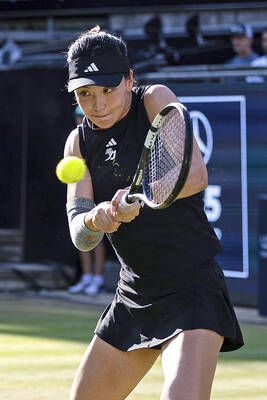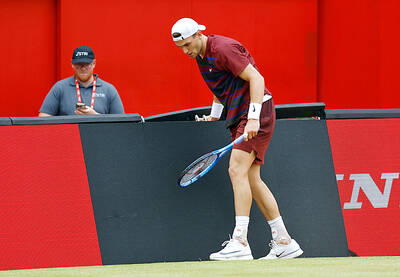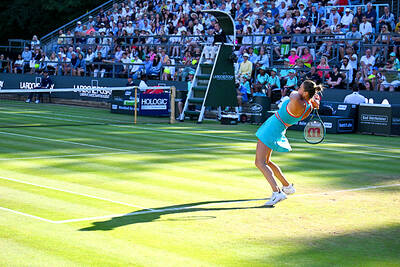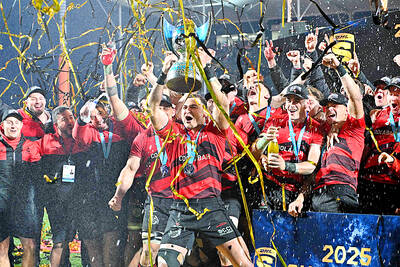From sweatbands to secret hand signals and even peeling oranges — human rights and other activists are seeking novel ways to have athletes circumvent tight security at the Olympics and pressure China.
Faced with a barrage of campaigns on issues such as Tibet, press freedom and Darfur, China’s communist rulers are mounting a massive security clampdown ahead of next month’s Games, saying they will tolerate no dissent of any kind.
Organisers have invoked the Olympic Charter, the rulebook drawn up by the International Olympic Committee, for overseeing the Games, which forbids any form of “demonstration or political, religious or racial propaganda” from athletes.
However groups are coming up with an array of ways to get around the rules in the hope of creating a moment similar to when black American sprinters Tommie Smith and John Carlos famously raised their black glove covered fists at the 1968 Mexico Games.
Pro-Tibetan activists are urging athletes at the Olympics to make a simple T hand signal to indicate support for the Tibetan cause.
European activists are planning to wear orange as a human rights protest while other groups say they ask athletes to wear sport wristbands or find different ways to express their political positions at the Games.
The T sign, similar to the coach’s time-out signal in a basketball game, is an easy-to-perform gesture that could become an effective symbol of protest at the Games, according to the London-based Free Tibet Campaign.
“Now all we need are some brave athletes who are willing to show they care about human rights by making the “T” sign in Beijing,” Anne Holmes, acting director of the group, said on the Web site www.tfortibet.org.
Beijing has come under international criticism for staging a crackdown on pro-Tibetan protests in the Himalayan territory in March, which exile groups claim has left more than 200 people dead.
Other groups using symbols to dodge tight Olympic security include Team Darfur, a group of more than 360 past and current athletes from 49 countries dedicated to ending the bloodshed in Darfur.
China, a close ally of the Khartoum government, has come under international criticism for not doing more to stop civil conflict in the western Sudanese region of Darfur.
Members of Team Darfur who will compete in the Beijing Olympics and Paralympics will be identifiable from their distinctive, green and black sweatbands.
They will also sport special wristbands, “to show the world that the world’s athletes will act as one to fight for the protection of the people of Darfur,” according to the group’s Web site.
Another activist group has urged US President George W. Bush to wear a wristband highlighting the fate of North Korean refugees in China.
Bush has said he will attend Friday’s opening ceremony and the US-based North Korean Freedom Coalition asked him in a letter last month to wear the wristband to show solidarity with the refugees.
Up to 300,000 North Koreans are believed to have fled to China, which terms them economic migrants and hunts them down for repatriation. Some face execution on their return home, according to reports.
On human rights, European activists say they have found a simple way of getting their message out despite heavy security in Beijing.
Set up by Danish sculptor Jens Galschiot, a group called The Color Orange is urging athletes and spectators to wear “anything orange” during the Games as a symbol of protests against China record on human rights.
“Even peeling an orange would, under the right circumstances, be a powerful statement,” the group said on its Web site, www.thecolororange.net.

Twelve days after winning her second Grand Slam title at the French Open, Coco Gauff fell at the first hurdle on grass in Berlin on Thursday as beaten Paris finalist Aryna Sabalenka advanced to the quarter-finals. Recipient of a first round bye, American Gauff lost 6-3, 6-3 to Chinese qualifier Wang Xinyu as world number one Sabalenka beat Rebeka Masarova 6-2, 7-6 (8/6) in her second round tie. Winner of 10 main tour titles, including the US Open in 2023 and the WTA Finals last year, Gauff has yet to lift a trophy in a grass-court tournament. “After I won the first

While British star Jack Draper spent the past week trying to find rhythm and comfort in his first grass tournament of the season at the Queen’s Club Championships in London, Jiri Lehecka on Saturday bulldozed everything in his path. After more than two furious hours of battle, their form was reflected in the final scoreline as Lehecka toppled a frustrated Draper, the second seed, 6-4, 4-6, 7-5 to reach the biggest final of his career, against Carlos Alcaraz. Lehecka is also the first Czech to reach the men’s title match at Queen’s since Ivan Lendl lifted the trophy in 1990. Draper, who

Top-ranked Aryna Sabalenka staged a “crazy comeback,” saving four match points before beating Elena Rybakina 7-6 (6), 3-6, 7-6 (6) in the quarter-finals of the Berlin Open on Friday. Sabalenka was 6-2 down in the final-set tie-breaker, but won six straight points to reach her eighth semi-final of the season. “Elena is a great player and we’ve had a lot of tough battles,” Sabalenka said. “I have no idea how I was able to win those last points. I think I just got lucky.” “I remember a long time ago when I was just starting, I won a lot of matches being down

The Canterbury Crusaders edged the Waikato Chiefs 16-12 in an intense Super Rugby Pacific final battle in Christchurch yesterday to claim their 15th title in 30 years of the Southern Hemisphere competition. Hooker Codie Taylor scored a try and Rivez Reihana contributed 11 points from the kicking tee as the most dominant team in Super Rugby history extended their perfect home playoff record to 32 successive matches since 1998. The Chiefs, who were looking for a first title since 2013, scored first-half tries through George Dyer and Shaun Stevenson, but were unable to register a point after the break and fell to